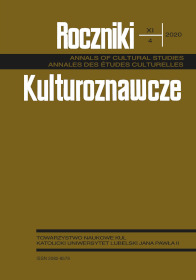The Myth of the “Dark” Middle Ages in the Contemporary Social Discourse
Abstract
In our reflection on Europe’s cultural identity, we will refer to its three sources: Greek philosophy, Roman law, and Christianity. The third source, Christianity, is considered to be the heart of medieval culture, which created Europe based on evangelical values such as truth, love, compassion, humility, equality, fraternity, freedom, and human dignity. Nevertheless, the medieval era is still being depreciated and ignored like no other. The myth of the “dark” Middle Ages, promoted in the Renaissance, passed on and deepened in subsequent eras, became permanent and has a lasting place in the common consciousness. Medievalists ask: “why is this happening?” In popular discourse, we constantly hear the epithet about the “dark” Middle Ages. The presented research aims to determine the state of knowledge about medieval culture as well as contemporary people’s perceptions of that era. The results of surveys aimed at examining the presence of the myth about the “dark” Middle Ages in the awareness of contemporary society may be a contribution to further research on this phenomenon. The importance of this problem lies in the fact that it reflects contemporary man’s relationship to the values represented by medieval culture.
References
Copleston, Frederick. Historia filozofii, t. 6: Od Wolffa do Kanta. Przeł. Jerzy Łoziński. Warszawa: Instytut Wydawniczy Pax, 2005.
Dawson, Christopher. Szkice o kulturze średniowiecznej. Przeł. Jan Sulowski. Warszawa: Instytut Wydawniczy Pax, 1966.
Delpech, Thérèse. Powrót barbarzyństwa w XXI wieku. Przeł. Wiktor Dłuski. Warszawa: Media Lazar Nadir, 2008.
Delsol, Chantal. Nienawiść do świata. Totalitaryzmy i ponowoczesność. Przeł. Marek Chojnacki. Warszawa: Instytut Wydawniczy Pax, 2017.
Génicot, Léopold. Powstaje nowy świat. Przeł. Jan Stanisław Łoś. Warszawa: Ossolineum, 1964.
Le Goff, Jacques. Inteligencja w wiekach średnich. Przeł. Eligia Bąkowska. Warszawa: Oficyna Wydawnicza Volumen, Dom Wydawniczy Bellona, 1997.
Górny, Grzegorz. „Pożar Notre Dame: znak do odczytania”. „Niedziela” (ogólnopolska) 2019, nr 17. Niedziela.pl. Dostęp 22 lutego 2021. https://www.niedziela.pl/artykul/142506/nd/Pozar-Notre-Dame-znak-do-odczytania.
Jan Paweł II. Pamięć i tożsamość. Rozmowy na przełomie tysiącleci. Kraków: Wydawnictwo Znak, 2005.
Kazimierczak, Zbigniew. „U źródeł automitycznej religijności Nietzschego”. W: Ateny, Rzym, Bizancjum. Mity Śródziemnomorza w kulturze XIX i XX wieku, red. Jarosław Ławski i Krzysztof Korotkich. Antyk Romantyków, 75–80. Białystok: Wydawnictwo Uniwersyteckie Trans Humana, 2008.
Krasicki, Jan. Po „śmierci Boga”. Eseje eschatologiczne. Kraków: Homini, 2011.
Saint-Exupéry, Antoine de. Mały Książę. Przeł. Jan Szwykowski. Warszawa: Instytut Wydawniczy Pax, 1971.
Scruton, Roger. Pożytki z pesymizmu i niebezpieczeństwa fałszywej nadziei. Przeł. Tomasz Bieroń. Poznań: Zysk i S-ka, 2012.
Tatarkiewicz, Władysław. Historia filozofii, t. 1: Filozofia starożytna i średniowieczna. Warszawa: Państwowe Wydawnictwo Naukowe, 1970.
Wielgus, Stanisław. Z badań nad średniowieczem. Lublin: Redakcja Wydawnictw KUL, 1995.





